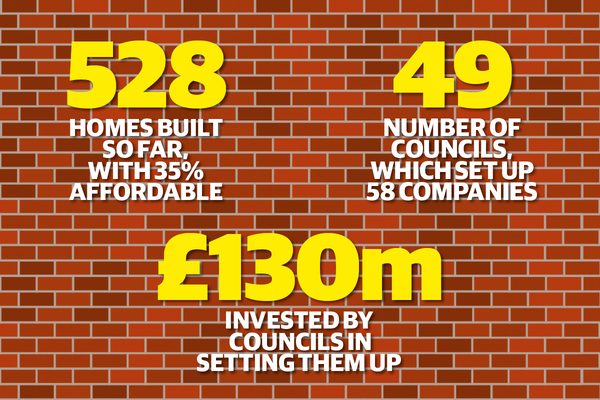You are viewing 1 of your 1 free articles
 Dr Janice Morphet
Dr Janice MorphetJanice Morphet is Visiting Professor in the Bartlett School of Planning UCL Janice was a member of the Planning Committee of the London 2 ...more
Barriers to setting up council-owned housing companies
Difficulties spending Right to Buy receipts and confusion over the Housing Revenue Account, planning and rent-setting – Professor Janice Morphet looks at why more councils aren’t setting up housing companies
After seven years of austerity, local authorities are asserting their own priorities by directly providing housing again.
In a survey reported in Inside Housing in 2016, more than a third of councils said they they had or intended to establish a housing company. But what is holding back the rest?
The Local Government Association (LGA) has frequently mentioned the Housing Revenue Account (HRA) borrowing cap imposed by the Treasury on the 199 councils that are registered as social housing providers as the main barrier.
Further, many local authorities are having difficulties in spending Right to Buy receipts. As part of our current research project funded by the National Planning Forum and the Royal Town Planning Institute, we found that several local authorities have returned their receipts to the Treasury as they cannot spend them in the time allowed. But in Hackney Council’s case, they offered these receipts to housing associations, suggesting some flexibility.
“Many local authorities are having difficulties in spending Right to Buy receipts.”
Other blockages have been suggested in our research so far. Many of these are said to exist in planning, where there is an assumption that five-year housing land supply in local plans is only for private developers.
This misapprehension has led to Homes and Communities Agency (HCA) and LGA initiatives for local authorities to focus on stalled sites, unimplemented planning consents or slow developer build-out rates, but will these accelerate developer output?
Councils are increasingly taking direct action to provide housing using Public Works Loan Board funding through wholly owned companies to build and then sell or rent, at market or social rents using powers under the Localism Act. However, recent governments have been lukewarm about councils establishing housing companies, nor is this approach set out in the recent LGA initiative.
A small reference in the Housing White Paper to the potential of local authority provision was enough to encourage more councils to engage in this approach, although other councils remain sceptical about these powers while several officers have reported that any progress in establishing a housing company has depended on the enthusiasm of new chief officers.
Where councils do have housing companies, there appear to be some uncertainties about their powers to set rents.
Some that have requested external legal advice on the powers of wholly owned housing companies to set social rents have been told that this is not lawful, or at least there is some uncertainty about the vires which is preventing them moving forward.
“Some have reported that councillors and officers have difficulties understanding the difference between HRA and wholly owned housing companies.”
Some local authorities consider that general funds can only be used to support HRA development rather than provide housing using separate companies. Some have reported that councillors and officers have difficulties in understanding the differences between HRA and wholly owned housing companies, while in others with major HRA programmes, there appears to be a reluctance to establish a housing company in case it reduces the role of the existing programme or leads to a loss of control.
Yet, despite all this, housing companies are being established by a wide variety of councils as a local response to their problems and priorities. This is not a big versus small council issue. South Cambridgeshire has four housing companies while Gateshead is delivering housing through a non-specific general trading company.
Motivations are also varied. Barking and Dagenham and Luton are building to combat homelessness. Some, like Nottingham and Birmingham, want to change the character of their areas and improve the quality of design.
Local authorities are also stepping in where housing associations and private developers are absent. This supports growth or to deliver housing commitments in Local Plans. Many local authorities have responded positively to government pressure to increase planning consents for housing, only then to be frustrated by developers operating low build-out rates or not implementing planning consents at all.
“Each council is finding its own way of providing housing that solves the problems it has identified.”
Many are directly engaging with developers to find the barriers to development, twin-tracking if necessary by preparing for compulsory purchase of the same sites.
Last year’s Inside Housing survey found that 125 local authorities have or will be establishing a housing company, but will this renewed approach to housing provision ever return to the 100,000 dwellings a year that local authorities were providing before Margaret Thatcher restricted their activities and introduced Right to Buy? At present, this is unclear.
Many council companies are starting up with relatively small developments. However, evidence from the research indicates that the number of starts on site are increasing each year, and the type of development is becoming more varied and complex, from site size to tenure mix.
Councils providing housing directly again could take off. What is clear is that localism matters. Each council is finding its own way of providing housing that solves the problems it has identified – from generating revenue to tackling homelessness, dealing with stalled sites and supporting economic growth. Each council has its own motivations and this localism might hold the key to the return to one of their fundamental roles in providing housing.
The next stage of our research is to see how many local authorities across England are engaging in direct provision of housing. To respond to the survey, click here.
Janice Morphet, visiting Professor, Bartlett School of Planning, University College London











